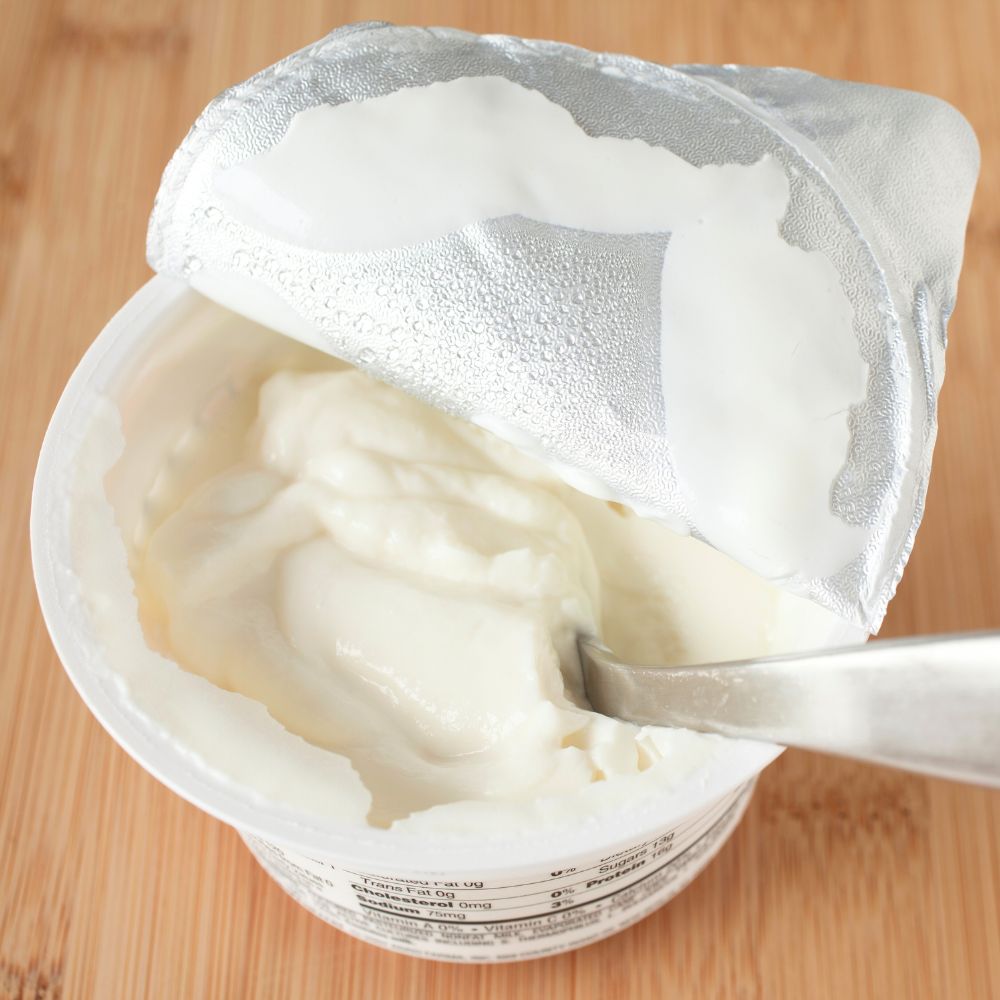Here’s a list of effective food substitutes for whey protein powder, including their protein content, reasons why each is a good alternative, and any necessary cautions.
1. Greek Yogurt
- Protein Content: About 10 grams per ½ cup.
- Why It’s a Good Alternative: Creamy, versatile, and packed with probiotics that support gut health. It enhances the texture of smoothies and baked goods.
2. Cottage Cheese
- Protein Content: Approximately 14 grams per ½ cup.
- Why It’s a Good Alternative: High in protein and low in fat, cottage cheese has a mild flavor that blends well in both sweet and savory dishes.
3. Silken Tofu
- Protein Content: Around 5 grams per ½ cup.
- Why It’s a Good Alternative: A great plant-based option, silken tofu is low in calories and provides creaminess, containing all nine essential amino acids.
4. Pea Protein Powder
- Protein Content: About 15-20 grams per scoop (30 grams).
- Why It’s a Good Alternative: Hypoallergenic and suitable for those with dairy allergies, pea protein has a good amino acid profile and mixes well in smoothies.
5. Hemp Protein Powder
- Protein Content: Roughly 10 grams per 3 tablespoons.
- Why It’s a Good Alternative: Contains healthy omega-3 and omega-6 fatty acids, making it nutritious. Its nutty flavor complements various recipes.
6. Chia Seeds
- Protein Content: About 5 grams per 2 tablespoons.
- Why It’s a Good Alternative: Rich in fiber and omega-3 fatty acids, chia seeds also absorb liquid, thickening smoothies and recipes effectively.
7. Flaxseeds
- Protein Content: Approximately 3 grams per 2 tablespoons.
- Why It’s a Good Alternative: High in fiber and omega-3s, ground flaxseeds add nutrition and can easily be incorporated into smoothies and baked goods.
8. Nut Butters
- Protein Content: About 7 grams per 2 tablespoons (varies by type).
- Why It’s a Good Alternative: Rich in healthy fats, nut butters enhance flavor and provide protein in smoothies and energy bites.
9. Quinoa
- Protein Content: Around 4 grams per ½ cup cooked.
- Why It’s a Good Alternative: A complete protein, quinoa is excellent for vegans and vegetarians, adding a nutty flavor and unique texture.
10. Oats
- Protein Content: About 6 grams per ½ cup (dry).
- Why It’s a Good Alternative: Oats provide protein and fiber, adding bulk and texture to smoothies and baked goods.
11. Egg Whites
- Protein Content: Approximately 6 grams per ¼ cup (liquid).
- Why It’s a Good Alternative: Lean source of high-quality protein with no fat.
- Caution: Raw egg whites can pose a risk of salmonella contamination. To reduce this risk, consider using pasteurized egg whites, especially when adding to protein shakes.
Quick Reference: Protein Content and Benefits of Whey Protein Substitutes
| Food Substitute | Protein Content | Why It’s a Good Alternative |
|---|---|---|
| Greek Yogurt | ~10g per ½ cup | Creamy, probiotic-rich, great for smoothies and baking |
| Cottage Cheese | ~14g per ½ cup | High protein, low fat, mild flavor for versatile use |
| Silken Tofu | ~5g per ½ cup | Plant-based, low calorie, complete amino acids |
| Pea Protein Powder | 15-20g per 30g scoop | Hypoallergenic, good amino acid profile |
| Hemp Protein Powder | ~10g per 3 tbsp | Contains omega-3 and omega-6, nutty flavor |
| Chia Seeds | ~5g per 2 tbsp | High in fiber and omega-3, thickens recipes |
| Flaxseeds | ~3g per 2 tbsp | High fiber and omega-3, easy to add to foods |
| Nut Butters | ~7g per 2 tbsp (varies) | Healthy fats and protein, enhances flavor |
| Quinoa | ~4g per ½ cup cooked | Complete protein, vegan-friendly, nutty texture |
| Oats | ~6g per ½ cup dry | Protein and fiber, adds bulk and texture |
| Egg Whites | ~6g per ¼ cup liquid | Lean, high-quality protein (use pasteurized to avoid risk) |
Conclusion
These alternatives to whey protein powder provide diverse options for enhancing your protein intake while accommodating different dietary needs and preferences. With the added caution regarding raw egg whites, you can explore these substitutes safely and enjoy a variety of flavors and textures in your meals.
Frequently Asked Questions (FAQ)
If you’re lactose intolerant, plant-based options like pea protein powder, hemp protein powder, silken tofu, or seeds (chia and flax) are excellent alternatives that won’t upset your digestion.
Yes, many plant-based protein powders like pea and hemp provide a good amino acid profile and comparable protein amounts, making them effective for muscle building and recovery.
Absolutely! Both Greek yogurt and cottage cheese are high in protein, creamy, and versatile, making them great whole-food alternatives for smoothies and recipes.
Salmonella can be a risk when eating raw egg whites. To stay safe, use pasteurized egg whites or cook them thoroughly before adding to your diet.
While they have less protein than powders, chia and flaxseeds add fiber, omega-3 fatty acids, and help thicken recipes, making them nutritious and functional additions to meals.

